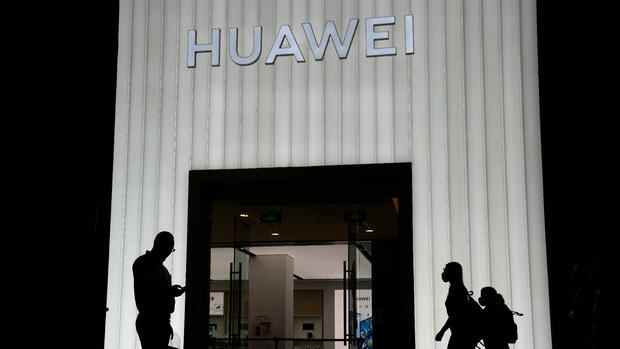Huawei is said to have a special relationship with the Chinese leadership.
(Photo: AP)
Berlin, Dusseldorf The city of Duisburg is putting its controversial cooperation with the Chinese tech group Huawei on hold for the time being. A spokesman for the Handelsblatt confirmed this on Wednesday evening. The assessment of the federal government and the EU is currently being awaited as to whether an exchange with Huawei can be maintained.
The spokesman stressed that this was done “against the background of the current relations between Russia and China”. At the same time, he did not rule out further cooperation in the future.
As soon as there is an assessment by the federal government, the city wants to “reassess the cooperation, taking all aspects into account”. The original agreement expired in October.
In the past few months, German politics has reassessed China and is much more critical of economic cooperation with China than it was a few years ago. Only on Wednesday did the federal government prohibit the takeover of a Dortmund chip factory by a Chinese company.
Top jobs of the day
Find the best jobs now and
be notified by email.
With regard to Huawei, too, skepticism has grown strongly in recent years. Critics see the state-affiliated IT group as a kind of Trojan horse for the Chinese regime. Secret services warn of possible influence or sabotage because the group produces, among other things, components for mobile networks that are considered critical infrastructure.
Huawei should make Duisburg a smart city
Nevertheless, people in Duisburg were proud of the cooperation for a long time. The city, which is also connected to China’s “New Silk Road” project via a train connection, had opened up to the Chinese economy to an unusual extent. Duisburg, as the city hall has been saying for years, wants to be “Germany’s China City” – and Huawei should help her with that.
The focus of the cooperation agreement with Huawei was on the mutual exchange of smart city ideas and approaches, according to a spokesman for the city. Concrete projects have not yet developed from this “non-binding cooperation agreement”. “In particular, the city did not use any of the company’s technological components in smart city projects,” said the spokesman.
However, Huawei was apparently already active in an advisory capacity. “With the input from the talks with Huawei, some projects, such as the self-propelled road sweeper or the smart street lamps, etc., could be implemented,” said the spokesman.
With the support of the Chinese government, Huawei has been rolling out its smart city technology worldwide for years. The focus is usually on the use of surveillance technology. According to a survey by the Center for Strategic and International Studies, the majority of the projects are being implemented in countries rated as “unfree” or “partially unfree”, such as Egypt, Pakistan or Nigeria. But there is also cooperation with Huawei in this area in Europe, for example the Spanish city of Barcelona concluded an agreement with the group three years ago.
Duisburg entered into the cooperation in October 2017. Huawei should upgrade Duisburg to a smart city to make the city more attractive “for people and investors”. This is what it says in a “Memorandum of Understanding” that Duisburg’s Mayor Sören Link and Yan Lida, then head of the Huawei Enterprise Business Group, signed in January 2018 in Shenzhen, southern China.
Apparently it hasn’t been of much use to the Duisburg location so far. The city spokesman announced that “during the corona pandemic and up to now, the cooperation with Huawei has come to a standstill”. Even the connection to the New Silk Road has not yet brought Duisburg the upswing that the city had hoped for.
To counteract this, Duisburg commissioned a study last year. The city also wants to find out “against the background of the increasingly critical perception” how it can benefit “even more from the economic dynamics in China” and what the risks are. The results should form the basis for a new China strategy.
More: Five questions and answers on the 5G debate and the role of Huawei.

